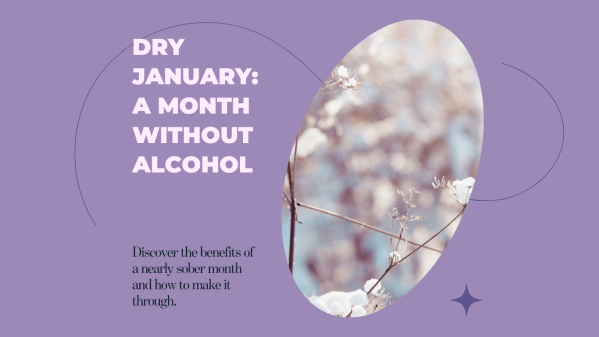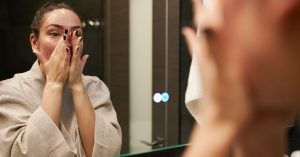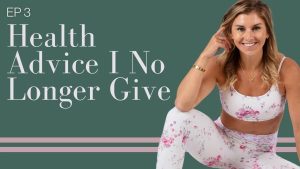I Tried Dry January and Did Not Expect This To Happen – Sarah Fit

I know, it’s February but for the first time I ever I attempted to complete Dry January. I wanted to attempt it to see how impacted my anxiety, brain fog and energy levels. In past years, I wanted to try it but the challenge lacked motivation. This year, I had a problem (anxiety, brain fog and low energy) and was curious to see if cutting alcohol would help.
The alcohol/anxiety felt like a hamster wheel. I had anxiety so I’d drink for relief but then the alcohol would cause more anxiety, so I’d have a glass the following day, repeat! I wanted off!
Did I complete dry January successfully? Pretty much!
I had one 40th birthday party where I did have two tequila and sodas and one Friday night where Nick and I split a glass of wine. Other than that though, I did not drink any other alcohol for the month of January.
Here’s what I noticed when I stopped drinking wine every night:
First, I noticed that I was sleeping better. I still wasn’t bouncing out of bed but I didn’t feel like garbage waking up.
Second, I wasn’t waking up at 3 AM with thoughts that I couldn’t suppress enough to go back to sleep. In the past month, I was getting up the middle of the night and sometimes couldn’t fall back asleep due to my mind racing about things like camp sign up, preschool, birthday party planning, worrying about nonrefundable hotel rooms, etc! During January, I noticed that these things largely stopped. I did wake up ONE night with racing thoughts.
Third, I didn’t crave alcohol or wine like I had in the past. Sort of like when I was pregnant, once you stop drinking, you stop craving it. I did enjoy things like kombucha, sleepy girl latte’s with Apothekary tinctures or Athletic Brewing beers on occasion.
Conclusion:
Not drinking wine regularly cut back my anxiety, a lot! I also had more patience and energy with the kids.
However, I can’t be sure if it was just the alcohol.
I didn’t just stop drinking in January to target my anxiety. I also got religious about taking ashwagandha during the day and magnesium before bed. I also practiced yoga 2x a week and tried to meditate once a week even for just 5 minutes.
My brain fog was reduced and my energy was much higher! However, this made me stay up later and that’s why I still struggled to get up in the morning.
But yet, I can’t help but think it was the alcohol that really helped me reduce my anxiety this past month.
I have drank on two occasion this February. One glass of wine as a date night on a Friday and two glasses the following Saturday and am happy to report, I did not get anxiety!!! I’m not planning to give up alcohol completely, yet.
Will I do dry January in 2025? Probably. However, I’m not going to avoid a glass of wine or cocktail if there’s a special celebratory event and I’d like to partake.
That being said, there’s no denying how alcohol can have complex effect on anxiety, particularly for women aged 35 and up, due to a combination of physiological, psychological, and social factors.
Here’s an overview of how alcohol can affect anxiety for perimenopausal women 35 and up:
- Short-term relief but long-term increase: Initially, alcohol may reduce stress and anxiety due to its sedative effects on the brain. However, this is temporary and often leads to increased anxiety levels once the effects wear off. Over time, reliance on alcohol to cope with anxiety can exacerbate anxiety symptoms.
- Hormonal changes: Women aged 35 and up may begin to experience hormonal changes associated with perimenopause or menopause. These changes can affect mood and anxiety levels. Alcohol can interfere with hormone regulation, potentially worsening anxiety symptoms.
- Sleep disruption: Although alcohol might seem to help with falling asleep, it actually disrupts sleep patterns and decreases sleep quality. Poor sleep can increase anxiety levels. Women in this age group may already be experiencing sleep disturbances due to hormonal changes, and alcohol can exacerbate these issues.
- Increased risk of depression: There is a strong link between heavy drinking and depression. Anxiety and depression often co-occur, and alcohol can worsen both conditions. Women may be particularly vulnerable to these effects as they age.
- Alcohol tolerance and dependence: As people age, their body’s ability to metabolize alcohol can change, potentially leading to higher sensitivity to alcohol’s effects or an increased risk of developing alcohol dependence. Dependence on alcohol can significantly increase anxiety levels, especially during withdrawal periods. If your body is metabolizing alcohol, it’s also NOT metabolizing fat which may hinder fat loss goals. Read more about how alcohol affects weight loss here.
- Physical health effects: Chronic alcohol use can lead to a host of physical health problems, including liver disease, heart disease, and a weakened immune system, which can all contribute to increased anxiety.
It’s important to note that everyone’s experience with anxiety and alcohol is unique, and the effects can vary widely from person to person. Additionally, there are many effective treatments for anxiety that do not involve alcohol, including therapy, medication, lifestyle changes, and stress management techniques.








